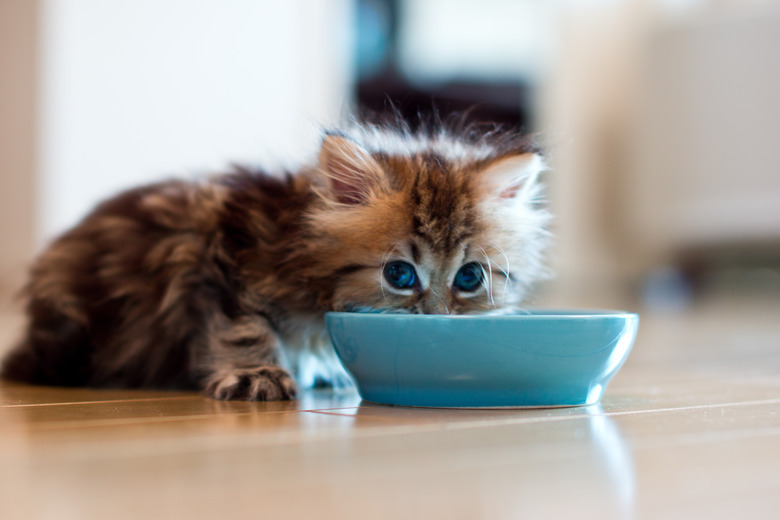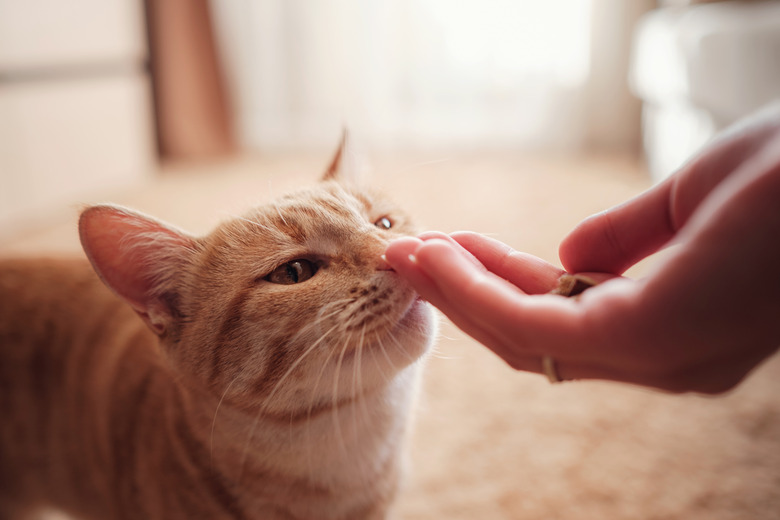How To Care For A Malnourished Cat
If a malnourished cat shows up on your doorstep, your first impulse may be to treat him to an all-you-can-eat feline buffet. Resist that impulse — it could harm the cat. Try feeding him small amounts of a quality cat food, and take him to the vet as soon as possible for a checkup. She will assess the cat's body condition and recommend a feeding plan, as well as check the animal for diseases such as feline leukemia or feline immunodeficiency virus.
Keep a malnourished cat away from other household pets — especially other felines — until your vet examines him and approves of his interaction with other animals. Not only might the cat carry diseases or parasites that can spread to other pets, but he likely has a compromised immune system and the presence of other animals may stress him.
Body condition scoring
Body condition scoring
The type of care your emaciated cat requires depends on his body condition score. Truly emaciated felines — those with no evidence of body fat and all of their bones protruding, or virtual "skin and bones" animals — need different care than those cats who are just thin.
How to reintroduce food after starvation
How to reintroduce food after starvation
While the thin cat probably will do well on a standard diet of high-quality cat food, that's not the case with an emaciated animal. A starving cat can die from metabolic disorders, known as refeeding syndrome, if the cat is given too much food too fast. Food must be gradually reintroduced to the starved cat.
While the cat was without food, his body depleted his reserves of carbohydrates, fats and proteins, resulting in electrolyte imbalances and reduced organ function. Feeding him too much at once can cause severe, possibly fatal electrolyte imbalances, along with fluid overload in the depleted heart and kidneys. Your vet may recommend an initial low carbohydrate, high-fat diet, fed in small amounts numerous times a day.
Refeeding syndrome generally develops within the first week after the starving cat starts eating regularly. After that, your vet will allow you to decrease the amount of daily feedings and increase the amount of food at each meal. Eventually, the cat may have access to free-choice feeding.
Introduce vitamins and supplements
Introduce vitamins and supplements
Certain vitamins and supplements may help a malnourished cat regain weight and health more quickly. These include probiotics, which help restore "good" bacteria to the intestinal tract. Your vet may give the cat a vitamin B-12 injection, and suggest vitamin B-12 supplements to mix in the animal's food. In addition to recommending vitamins and supplements, your vet will deworm the cat and treat him for any parasites.
Rule out medical causes of weight loss
Rule out medical causes of weight loss
Various medical problems can cause severe feline weight loss, and these must be ruled out or treated in a cat that is emaciated. Older cats, especially, may appear malnourished, even if they receive regular meals. Aged cats often have trouble digesting nutrients in their food. Conditions that cause weight loss include:
- Intestinal disease, such as inflammatory bowel syndrome
- Cancer
- Dental disease
- Kidney failure
- Liver disease
- Diabetes
- Hyperthyroidism.
Your vet will perform various tests to diagnosis these diseases, including bloodwork, urinalysis, fecal exams and thyroid tests. She'll likely conduct X-rays and/or ultrasounds to look for tumors or changes in organs. Treatment depends upon diagnosis.

